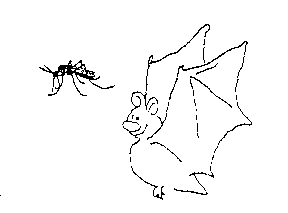

Last winter we got a call from the Ashland area, someone had destroyed a bat colony's wintering roost in their attic, putting the bats in a glass tank with a screen top and leaving them in the attic. One of the big problems with this was that they did it in January and never called us until the end of February. When the bats were disturbed they came out of hibernation, using up large amounts of their energy stores. They were unable to hang in the glass tank and had to lie on the bottom. By the time we were called 29 of the 38 bats had died.
We were able to help the 9 surviving Big Brown Bats, rehydrating them and feeding them until their weight got back up into a safe range. (By the way, these bats only weigh 1/2 an ounce!) Once they were in good condition we housed them in a hibernaculum - a container where they can spend the remainder of the winter in hibernation. This was placed in our basement in an area which maintains a temperature of around 45 degrees, the best range for bat hibernation. There they would stay deep in hibernation, until the weather warms and the insects they need for food are plentiful again.
Many people are afraid of bats, not realizing how harmless and extremely beneficial they are. One bat will eat 600 mosquitos in an hour - a small bat colony in your area will certainly help make summer evenings more pleasant! Bats in the tropics are responsible for pollinating over 300 different plants used for food and medical purposes and also for reseeding areas of former rainforest that have been devestated by clear-cutting and burning.
Two of the main fears that people have of bats are quite unfounded. Bats are not trying to fly into your hair or attack you. Due to their method of flight, a bat in an enclosed space will swoop back and forth trying to get away, coming close to you in the process. It may appear that the bat is coming after you, but bats are like most wild creatures when confronted by people - they only want to get away from us!
The other fear is the threat of rabies. Yes, a small percentage of bats have rabies. However, most of them die quickly when they contract the disease, never having contact with a human. Rabid bats are not aggressive and your chances are better of being struck by lightning than of being bitten by a bat....rabid or not.
If you should find a bat in trouble on the ground or have to remove one from your home please take the precaution of wearing a pair of lightweight leather gloves while handling the bat. Remember that bats are very delicate and try to avoid grasping them too tightly!
Consider yourself lucky if you have a colony of bats roosting in your house or barn! You have one of the most interesting small mammals of North America living near you and you will definitely benefit from their insect-catching abilities!